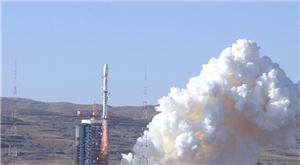China, Brazil to promote sci-tech cooperation
Xinhua, December 8, 2014 Adjust font size:
Chinese President Xi Jinping and his Brazilian counterpart Dilma Rousseff on Sunday vowed to enhance bilateral science and technology cooperation for the benefit of the two countries and the two peoples.
![A Chinese Long March-4B rocket carrying the CBERS-4 satellite, jointly developed with Brazil, blasts off in Taiyuan satellite launch center in north China's Shanxi Province, Dec. 7, 2014. It was the 200th launch of the Long March rocket family since April 24, 1970 when a Long March-1 successfully carried China's first satellite, Dongfanghong-1, into space. [Photo/Xinhua]](http://images.chinagate.cn/attachement/jpg/site1021/20141208/c03fd54aba1715ef7c7b4c.jpg)
|
A Chinese Long March-4B rocket carrying the CBERS-4 satellite, jointly developed with Brazil, blasts off in Taiyuan satellite launch center in north China's Shanxi Province, Dec. 7, 2014. It was the 200th launch of the Long March rocket family since April 24, 1970 when a Long March-1 successfully carried China's first satellite, Dongfanghong-1, into space. [Photo/Xinhua] |
The two leaders underlined the consensus in the congratulatory messages they exchanged on the launch of the CBERS-4 satellite, jointly developed by China and Brazil, on Sunday from China's Taiyuan base.
In his message, Xi noted that the CBERS (China-Brazil Earth Resources Satellite (CBERS) Program has set a successful precedent for developing countries to conduct cooperation in space industries.
In recent years, the program has yield fruitful results, improved the scientific and technological level in both countries, and made great contribution to the economic and social development of the two sides, he said.
The successful launch of the CBERS-4 satellite by Long March-4B rocket coincided with the 200th Long March rocket family launch, Xi said, adding that it demonstrated the latest achievements of bilateral science and technology cooperation.
The Chinese president hoped that the two countries would actively implement a decade-long bilateral space cooperation plan, strengthen technological innovation, further enrich the connotation of the China-Brazil comprehensive strategic partnership, and bring benefit to the peoples and the nations.
For her part, Rousseff said the CBERS Program showed potential of cooperation in science, technology and innovation between developing countries.
It also carries historic significance since Brazil and China will share the satellite images with African and Latin American countries under the spirit of South-South Cooperation, she added.
The launch of the CBERS-4 satellite strongly stimulated the development of Brazil-China comprehensive strategic partnership, she said, adding that Brazil will firmly supported the CBERS Program.


